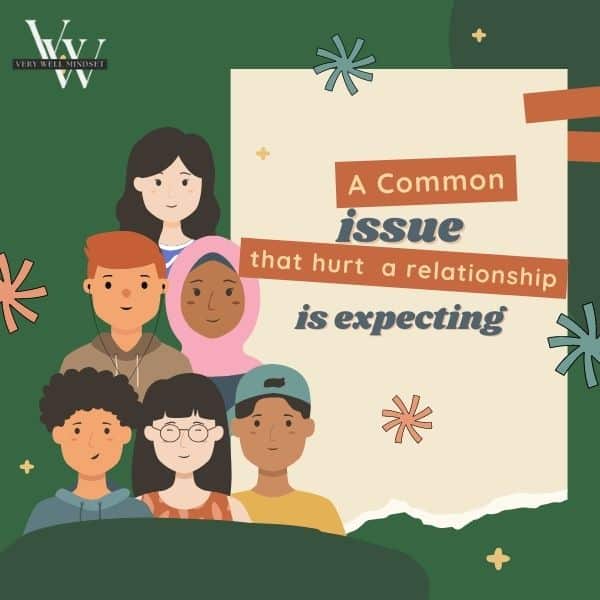How Unrealistic Expectations Can Hurt Your Relationship (and How to Fix It)
Unrealistic expectations are a common issue that can cause emotional distance, resentment and conflict in relationships. When partners assume their significant other can read their minds or be everything they need, it often leads to disappointment and frustration.
In this article, we’ll cover:
• Why unrealistic expectations are unhealthy
• Examples of common unrealistic expectations in relationships
• How unrealistic expectations hurt partners and the relationship itself
• Strategies for managing expectations in a healthy way
• Effective communication tips to resolve issues caused by past expectations
So let’s get started!
Why Are Unrealistic Expectations Unhealthy?
Unrealistic expectations are a problem for three main reasons:
- They’re unrealistic. No human can meet every need or want of their partner perfectly. We all have flaws and limitations.
- They create a “set up to fail” dynamic. When partners inevitably fail to meet exaggerated expectations, it breeds blame, anger and resentment.
- They disregard personal boundaries. Expectations that cross a partner’s comfort zone are unfair and can even feel manipulative.
Examples of Common Unrealistic Expectations

• That your partner will instinctively know what you need without being told.
• That your partner will make you happy and fulfil you. Happiness comes from within.
• That your partner will meet all your emotional needs and be your “everything”. This is too much pressure for one person.
• That your partner will never change or evolve, staying the same as when you met. People change over time.
• That your partner will always put you and the relationship first above other priorities like family, friends and career.
How Unrealistic Expectations Hurt Your Relationship
• They breed resentment when not met. Partners feel their partner is “letting them down”.
• They stifle personal growth. Partners may suppress their own needs to “keep the peace”.
• They threaten intimacy. Partners feel misunderstood, taken for granted and unable to be themselves fully.
• They create conflict. When expectations clash, it often leads to arguments and power struggles.
• They threaten self-esteem. Not living up to a partner’s expectations can make someone feel inadequate.
• They compromise vulnerability. Partners may hide their true selves to avoid “messing up”.
How to Manage Expectations in a Healthy Way
• Be clear about your needs but avoid demands. Focus on expressing your feelings in a non-accusatory way.
• Accept that your partner is human. They will make mistakes and have off days. Try to have grace.
• Communicate your boundaries. If an expectation crosses a line for you, say so lovingly, non-defensively.
• Check in regularly. Revisit and adjust expectations as both your needs and lives change.
• Focus on what you can control. You can only change yourself, not your partner.
• Practice compassion. Remind yourself unrealistic expectations often come from a place of fear, not malice.
Revising how you view and communicate expectations in your relationship can transform them from a source of hurt to a path toward even greater intimacy, understanding and partnership over time.
Here are some additional details on how unrealistic expectations can hurt relationships:

• They can breed resentment. When expectations go unmet, partners may resent each other for “failing” the other. This resentment can fester and poison the relationship.
• They ignore individual needs. Unrealistic expectations often assume one partner can or should meet all the other’s needs. This ignores each person’s individual needs that a partner cannot fulfil.
• They discourage honesty. Partners may hide their true thoughts, feelings and needs to avoid disappointing the other and violating their expectations. This breeds inauthenticity.
• They ignore personal growth. Unrealistic expectations assume partners will remain static and the same. But people naturally change and evolve, which expectations need to accommodate.
• They discourage self-development. When focused on meeting a partner’s expectations, one may neglect their own personal growth and self-development. This is unhealthy.
• They discourage compromise. Unrealistic expectations leave little room for compromise between partners. But compromise is essential for long-term relationships to adapt and evolve.
Here are some ways to set realistic expectations in a relationship:
• Communicate your needs – clearly and express what you need from your partner to feel loved, supported and connected. Focus on using “I” statements.
• Listen to your partner’s needs – actively listen to understand their needs, which may differ from yours. Make sure you both truly understand each other.
• Focus on core values – identify the core values that are most important to each of you in a relationship and build expectations around upholding those values.
• Express boundaries – share what expectations would cross a line or make you uncomfortable. Respecting each other’s boundaries is essential.
• Check in regularly – revisit expectations occasionally to see if anything has changed for either of you. Adjust as needed based on new realities.
• Manage disappointment – when expectations are not fully met, focus on understanding why rather than blame. Have empathy and grace.
• Expect change – realize that people and circumstances evolve. Flexible expectations can adjust to change.
• Look for solutions – when differences in expectations arise, focus the conversation on finding solutions that work for both of you. Compromise when needed.
• Express gratitude – show appreciation when your partner meets your stated needs. This positive reinforcement helps shape future behaviour.
Conclusion
So, in summary, unrealistic expectations often ignore individual needs, encourage inauthenticity, stifle personal growth and discourage compromise. While all relationships require some expectations, they must be grounded in realism, open communication and a willingness to adapt over time. Only then can true intimacy and connection flourish between partners.
Open, honest and ongoing communication is key to setting realistic expectations in a relationship grounded in shared values, mutual understanding, compromise and gratitude. Remember, it’s a two-way street – make sure your needs are balanced.

